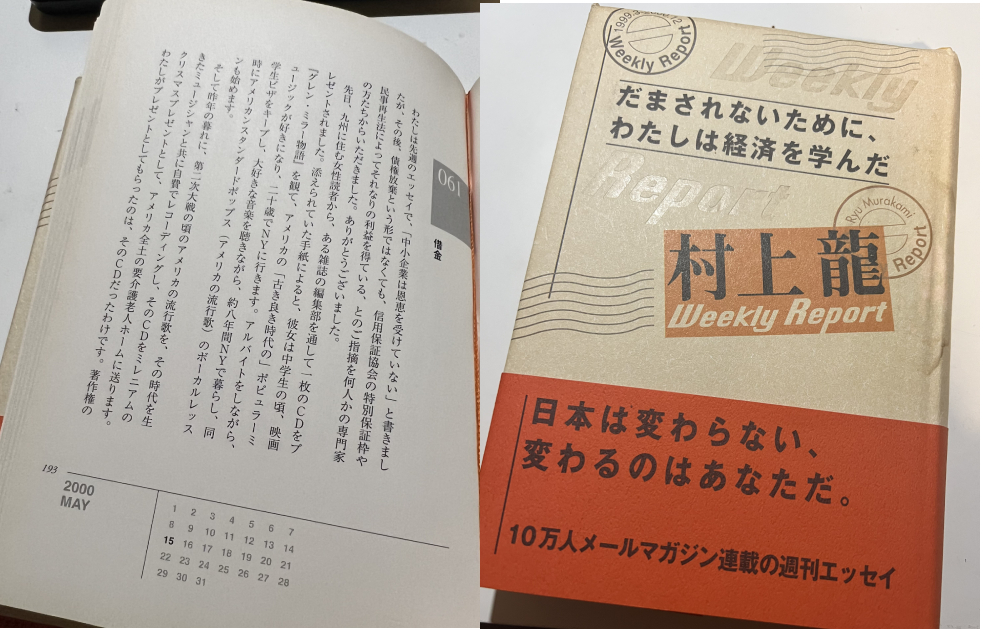
Editor-in-chief
Q: Thank you for your response to 109. The question was about the moral hazard that accompanies debt forgiveness, but as Mr. Yoneyama pointed out, I feel that the term “moral hazard” is taking on a life of its own. In addition, I wrote in the question that “SMEs are not benefiting”, but I understand from your answers that they are getting a certain amount of profit from the credit guarantee association’s special guarantee limit and the Civil Rehabilitation Law, even if it is not in the form of debt forgiveness.
The other day, a female reader living in Kyushu presented me with a CD through the editorial department of a certain magazine. According to the attached letter, she saw the movie “The Glenn Miller Story” when she was in junior high school, fell in love with American “good old days” popular music, and went to New York at the age of 20. While working part-time, she kept her student visa, and while listening to her favorite music, she lived in NY for about 8 years, and at the same time started vocal lessons of American standard pops (American popular songs).
And at the end of last year, she recorded American popular songs around the Second World War with musicians who lived in that era at her own expense and sent the CD to nursing homes all over the United States as a Christmas present for the millennium. It was the CD that I received as a present. Due to copyright issues, the CD cannot be sold. I didn’t think her act of sending Christmas presents to nursing homes across America was hypocritical.
She also has legitimate doubts that she sings American popular songs because she is Japanese. And she has no cloud in her motivation that she wanted to convey that “your songs are still alive.”
It was the CD, but I had a good impression of it. Beginning with “I’ll Walk Alone”, there are nostalgic masterpieces of my generation such as “Sentimental Journey” “It’s Been A Long Long Time”, and finally “White Christmas” is included. With an orthodox arrangement, an orthodox performance, and an extremely orthodox singing style, it is full of love and respect for American standard pops. And I thought her slightly husky voice was very cute.
The woman is currently paying off her recording debt while working as a lounge hostess in a city in Kyushu.
“We need an explanation that can be understood by the common sense of ordinary people who take it for granted that they should pay back their debts.
Mr. Kodama wrote that in his answer to Q:109.
It doesn’t have to be the word “moral hazard”, it can be anything from decadence to distrust, but I think the most harmful thing about debt waivers that have no explanation and vague responsibility is the spread of resignation in society.
One linguist points out that there are several phases of communication, but the most important is to give or receive the message that you are trying to communicate. Prisoners who are forbidden to talk will knock on the walls of adjacent cells to signal an “attempt to communicate.” The message is that she has the will to communicate. You could call it a kind of meta-message.
It is hard to believe that the meta-message of “an explanation that can be understood by the common sense of ordinary people who take it for granted that debts should be repaid” is being issued by banks and companies involved in debt forgiveness.
A society that does not have enough meta-messages will become degenerate. Just look at the social side of the newspapers for the past month or so to see how things are degenerating.
This is an article from Ryu Murakami’s mail magazine JMM (Japan Mail Media) in May 2000. Ryu Murakami is one of the top and most respected novelists in Japan.
An essay I picked up at a bookstore and bought a few months before. It’s fun to read, and I keep laughing. A few days later, wondering what to do, I sent a fan letter to Ryu-san to the publisher.
For the time being, I enclosed a CD about who I am, what I was doing, and the nursing home project as a self-introduction.
I am not very good at writing letters, so I have enclosed a letter that I typed on a computer. About 10 years later, I looked back at the data in that letter. It was a terrifyingly bad article. It was so embarrassing that I felt like I could shoot fire from my face and fly to Mars. Nevertheless, Mr. Ryu accepted my letter with sincerity. And most of all, he understood what I wanted to do and what I thought about the song, which no one understood, and put it into words.
But I’ve always been insecure and didn’t deserve those words. For nearly 20 years, I have avoided reading or watching Ryu’s TV programs and Ryu’s works.
From 2013, I will be involved in Cuba. And it was Cuba, the Cuban people, and the music that I was able to rebuild that melted the issues in my heart.